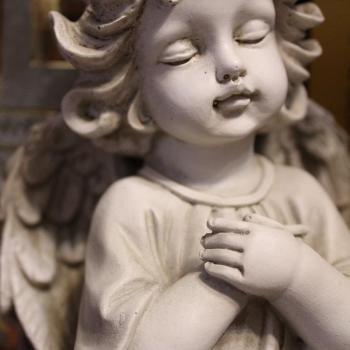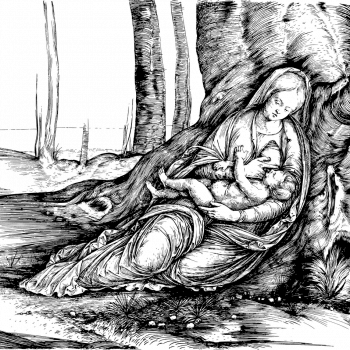
With the birth of each new child, there springs hope for a better world. Each child is so fresh from the Divine realm that we instantly recognize the “God-stuff” in them. They seem in the early days to have one tiny foot comfortably in Heaven and one tiny and tentative foot here on Earth. They effortlessly draw from us the deepest love. And they return that love with their wide open eyes, deep wells of sacred wisdom. We recognize that each new little creature is indeed created in the image of God, a spark of God on Earth, and are reminded through their gaze that so are we. Each of us comes with a unique story to tell, with a piece of the great puzzle, with a thread to weave into the tapestry of human history and human spiritual evolution. In this essay I will explore the idea that no story, no puzzle piece, no thread is unnecessary, repetitive or dispensable. Each is unique. Will we bless this uniqueness or will we teach our children our prejudices? Can we deliver a world of universal acceptance, support, and respect for all our children?
Embracing our and others’ uniqueness
Using the context of creativity and the artist, Martha Graham (1894-1991), American modern dancer, choreographer, and deeply influential innovator speaks passionately of the uniqueness of each of us,
“There is a vitality, a life force, an energy, a quickening that is translated through you into action, and because there is only one of you in all time, this expression is unique, and if you block it, it will never exist through any other medium; (it will) be lost. The world will not have it”.
Everyone is created to sing his or her own song – everyone. Unexpressed, a song “. . . will never exist through any other medium; it will be lost”. We can arrive at no true measure of what is lost when someone is unable for whatever reason to reach their full potential, the loss either to that person or to the rest of us, for our interconnectedness is profound. What grows, transforms and evolves in me, affects and facilitates changes in you. What does not grow, transform and evolve in me, hampers, delays and may even deny change in you. What, then, is lost to human understanding, to human evolution and fulfillment by the unexplored, the undiscovered, the unshared and the unappreciated?
Graham instructs us in self-acceptance. She believes that all of our voices and our self-expression are worthy and necessary. She goes further to show us the key to keeping aligned with one’s own song. She suggests that we notice, recognize and honor the urges that motivate us,
“It is not your business to determine how good it is, not how it compares with other expression. It is your business to keep it yours clearly and directly, to keep the channel open. You do not even have to believe in yourself or your work. You have to keep open and aware directly to the urges that motivate you.”
Graham urges us to be open to our divinity, the essence of which is a creative force that is constantly emanating. What moves you, when do you feel good about yourself, what actions empower you, what brings you joy, what makes your heart sing? Move confidently toward those things.
Once we can honestly embrace, honor and experience joy in our own uniqueness and that of all others, how do we promote that level of acceptance in the larger world? By working from the exterior to the interior, that is, by working with the laws we create, the guidance of scripture and our own strength and evolution of soul, I believe we can create an environment to do just that.
Need for basic rights and protections
Learning to accept and embrace our diversity is often a steep learning curve for society, causing discord, angry rhetoric, even violence. Governments make laws to protect the vulnerable, and sometimes make laws that prey on the vulnerable. Laws, often and especially those most hard won, can be our first line of defense against our prejudices and tendency to marginalize of our fellow humans. We compose great documents, “inspired” documents to guide us. The United States’ Declaration of Independence clearly states, “We hold these truths to be self-evident, that all men are created equal, that they are endowed by their Creator with certain unalienable rights, that among these are Life, Liberty and the Pursuit of Happiness.”
What does it mean “to be a God-given” right? We grasp it intellectually with our “inspired” language, but find it difficult to implement. It is the duty of government to point the way, to whatever degree to which it is capable at any point in history. It is the responsibility of all of us to initiate new measures to address the inequity we find among us. We are also asked to be vigilant in our assessment of laws that already exist and work to ensure their rightful application. Over time we have been capable of expanding upon that initial enlightened language, extending the rights and privileges of life, liberty and the pursuit of happiness to a growing number of previously marginalized groups. We are capable of continuing to expand into deeper levels of spiritual embodiment and spiritual understanding now.
Modeling inclusivity
Laws speak to our heads, and sometimes to our hearts. Scripture speaks to both our heads and our hearts. The Christian message is one of inclusivity, above all else. Throughout the gospels, through his teachings, actions and associations, Jesus models this message for us. He is regularly challenged by his detractors for associating with women, foreigners, tax collectors, the poor and the afflicted. In these challenging times, we need consider what it means to be a Christian, a follower of Christ. We must go beyond passive tolerance to active engagement, beyond an “intellectual acceptance” of those we never physically encounter, to an active commitment to their protection and ability to thrive.
Empowering others is the work of the soul
What is our responsibility to those who move into and out of our lives? In our daily encounters, do we seek ways to nurture and support the gifts we recognize in others? Do we regularly engage in freeing and empowering others? Or are we threatened by others’ gifts? Are we strong enough to see and act, knowing that our support of others takes nothing away from the “value” of our own gifts, the strength of our own relationships? Caroline Myss says that it takes a certain “stamina of soul” to engage in what she describes as “soul service,” serving others in an empowering way, a way of helping others which honors and develops their “gifts.” Can we commit to “soul service” person by person, relationship by relationship in our own lives? If so, our promise to our children of a world in which their gifts will be recognized and honored is much closer to becoming a reality.
Conclusion
If each of us is an emanation of God and everything that we see is an expression of God-stuff, what is our responsibility beyond our human brothers and sisters, to all sentient beings, to our planet and beyond? We humans are not the only pieces of the puzzle – all sentient beings, Mother Nature, planet Earth are all part of our larger tapestry.
We can take responsibility for change now, or we can do it later, but we will suffer the consequences while we wait. How many detours do we want to take? How many eddies in the stream of life do we want to get caught in, until little by little, watching the reverse flow, the almost invisible buildup of force moves us out of the eddy?
Can we give all our children a world to believe in? Not a perfect world, but a world of acceptance, respect and support in which they are empowered to grow into their full divine expression.












